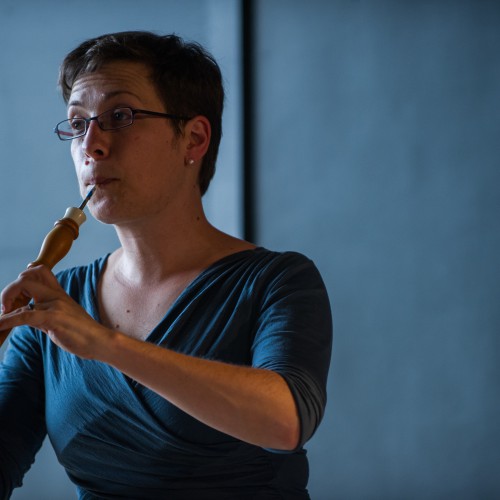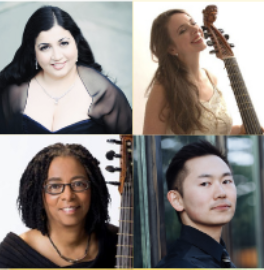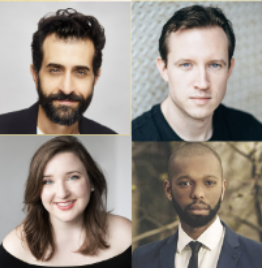by Jarrett Hoffman

I reached out to Les Délices artistic director Debra Nagy to learn more about these three very different programs, but also to talk about the new role she’s taken on for this series: interviewer. And whether you’re Conan O’Brien or Debra Nagy, there’s a lot that goes into that.
For Nagy, it starts with a “discovery call” with someone she’d like to bring on the show: “a very open phone call that is maybe as much as an hour long,” she said during our own recent call over Zoom. Of course, she’ll already know in advance what someone’s specialty is, “but also, people surprise me,” she said. From there, and sometimes with a second phone call to further refine a topic, she can begin to weave a web that ties together different discussions and performances (all to be pre-recorded).
During the final taping of each episode, Nagy has enjoyed the challenge inherent in any interview: steering a conversation so that it’s both substantive and concise. The interviewee, of course, plays a part in that as well: both sides have to come together in a sort of dance that’s simultaneously organic and prepared.
Not all musicians have experience in that area. Nagy admitted that she herself has struggled with being interviewed in the past, especially when there are time limits involved, like on the radio. “You need to know what it is that you intend to say — what you need to get out.”
But beyond that, there’s another element that’s central to these SalonEra conversations: “We want to keep it friendly and relaxed,” Nagy said. “This is really about creating a space where people can show up as themselves.”
She pointed out that six months into the pandemic, “everybody is in a different situation,” with different comfort levels when it comes to producing their own audio and video, and different struggles with their physical environment and headspace. “You’ve got to meet them where they are and with what’s on their mind.”

“We’re bringing together three viol players who don’t actually know each other, and who in a way are all doing different things,” Nagy said. Still, common threads such as manuscript sources and personal interpretation have emerged. “It turns out that both Arnie and Pat are working from some less well-known manuscript sources that require some decoding.” Another theme: tracing the history of music for the viol.
Tanimoto will perform works by Carl Friedrich Abel — “the last gamba virtuoso of the 18th century,” Nagy said — that represent the twilight period of the instrument. Neely will play a Bohemian prelude “that’s very stylus fantasticus,” and will also address the debate over its authorship. Corriveau will introduce the pardessus de viole and discuss the role that instrument played in the history of women making music. And Panthaki will perform works by Purcell and join in a viol consort song by Byrd.
While episodes of SalonEra have so far alternated between conversation and music, Nagy plans to incorporate different visual elements in these next episodes. “I was talking to Arnie, and I realized, wouldn’t it be great to show this manuscript page when we start discussing interpretation?” Nagy said.

One thread that runs through parts of that episode is an 18th-century manuscript known as the Codex Martínez Compañón, or the Codex Trujillo. That will give Nagy another opportunity to share beautiful visuals: the manuscript includes over 1,400 watercolors which helped to serve as a record of life in the diocese of the Bishop of Trujillo, Peru.

Soprano Hannah De Priest, tenor Karim Sulayman, and baritone Jonathan Woody will sing works by Schubert (Der Erlkönig, Prometheus, and Der Tod und das Mädchen), Mendelssohn (Hexenlied), and Loewe (De Erlkönig), joined by Michael Pecak on a late 18th-century Viennese fortepiano. And that episode will tie in with “Bewitched” (October 22), the first entry in Les Délices’ virtual concert series.
Of course, the many musicians involved in SalonEra are not just names on a page. They’re people who will be interacting — perhaps reconnecting, or maybe getting to know each other for the first time. Not only delivered but created remotely, SalonEra has a special ability to bring people together who might otherwise never have met.
One example came during the making of Episode Three. Having delved deeper and deeper into Indigenous Métis songs over the years, baritone Jonathon Adams had been using materials from ethnomusicologist Lynn Whidden, whose life’s work has been preserving those songs. But they had never connected.
“Jonathon and I had this conversation, and I said, well, would it be interesting to talk to her?” The baritone’s response was an enthusiastic yes. So Nagy found Whidden on Google and reached out — and a few days later, the three of them came together for discussion.
“Now it also becomes the beginning of a relationship for them,” Nagy said. “I think that will be hugely important and productive for Jonathon in terms of expanding that repertoire and getting a deeper understanding of what’s there. So it feels a bit amazing, actually, to have been in a position to enable that.”
You can watch SalonEra on Les Délices’ Facebook page, YouTube channel, and on the series’ website. Tickets are free, with a suggested donation of $10. A live Q&A takes place after the premiere, and the episodes stay available for 48 hours.
Published on ClevelandClassical.com September 29, 2020.
Click here for a printable copy of this article



